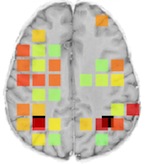

This research explores how to determine when mathematical problems are solved by retrieval versus computation strategies. Past research has indicated that verbal reports, solution latencies, and neural imaging all provide imperfect indicators of this distinction. Participants in the current study solved mathematical problems involving two distinct problem types, called 'Pyramid' and 'Formula' problems. Participants were given extensive training solving 3 select Pyramid and 3 select Formula problems. Trained problems were highly practiced, whereas untrained problems were not. The distinction between untrained and trained problems was observed in the data. Untrained problems took longer to solve, more often used procedural strategies and showed a greater activation in the horizontal intraparietal sulcus (HIPS) when compared to trained problems. A classifier fit to the neural distinction between trained-untrained problems successfully predicted training within and between the two problem types. We employed this classifier to generate a prediction of strategy use. By combining evidence from the classifier, problem solving latencies, and retrospective reports, we predicted the strategy used to solve each problem in the scanner and gained unexpected insight into the distinction between different strategies.
Tenison, C., Fincham, J., & Anderson, J. (2014). Detecting math problem solving strategies. An investigation into the use of retrospective self-reports, latency and fMRI data. Neuropsychologia, 54, 41-52.(Paper available here) (Author prepublication available here)
Tenison, C., & Anderson, J. (2013, June). Detecting math problem solving strategies using retrospective self-reports, latency, and fMRI data. Presented at the Organization for Human Brain Mapping, Seattle, WA.
Related work on strategy detection
Tenison, C., & Anderson, J. (2014, June). An Exploration of Two Methods for using fMRI to identify Student Problem Solving Strategies. In Proceedings of Workshop 'Utilizing EEG Input in Intelligent Tutoring Systems' at the 12th International Intelligent Tutoring Systems, Honolulu, HI.(Paper available here)